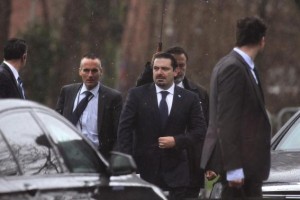 (Reuters) - Former Lebanese Prime Minister Saad al-Hariri says he is now ready to share power with his rivals Hezbollah if that's what it takes to help Lebanon finally form a government after nine months of political deadlock.
(Reuters) - Former Lebanese Prime Minister Saad al-Hariri says he is now ready to share power with his rivals Hezbollah if that's what it takes to help Lebanon finally form a government after nine months of political deadlock.
Linking up with the powerful Shi'ite group would be a sharp turnabout for Hariri and his Future party, a Sunni Muslim group that supports the Sunni revolt against Shi'ite-backed President Bashar al-Assad in neighboring Syria's civil war.
It also presents a personal challenge for the son of former premier Rafik al-Hariri, whose 2005 car bomb assassination was widely blamed on Hezbollah, which denies the allegation.
But Hariri told Reuters in The Hague, where he is attending the trial in absentia of four Hezbollah members charged with his father's killing, that he's not only ready to share power with Hezbollah but is optimistic they can come to an agreement.
"We're trying to run the country with everyone, because we do not want to keep anyone outside," he said in an interview late on Thursday after attending the opening session of the Special Tribunal For Lebanon.
"Lebanon is having a difficult time, especially since the international community has failed miserably to do anything for Syria," he said. "I think it is our duty towards the people of Lebanon to stabilize the country ... I am very optimistic."
Asked why he was willing to work with a group accused of playing a role in his father's killing, he said he was committed to the principle of "innocent until proven guilty".
"We know that they are allegedly persons who committed these crimes... But at the end of the day, this is a political party that has a big coalition, with Aounis (the Free Patriotic Movement of Michel Aoun) and other political parties," he said.
NOT RETURNING YET
Lebanon, still struggling to recover from its own 1975-1990 civil war, has been without a fully functioning government since Prime Minister Najib Mikati resigned last March. A caretaker cabinet with minimal powers is running the country until the squabbling parties can reach a deal to form a government.
Fears over Syria-inspired violence have only added to the pressure on politicians to find a compromise.
Hezbollah backs Assad, himself from the minority Alawite sect, an offshoot of Shi'ite Islam.
In the past two years, two prominent figures linked to Hariri's Future Party have been killed in car bombs many Hariri supporters blamed on Hezbollah, which denies the accusation.
Hezbollah's strongholds in Beirut have also been attacked with a series of car bombs and rocket strikes that have killed dozens of civilians. Many of those attacks were claimed by al Qaeda-linked Syrian rebel groups.
Negotiations to form a new government were revived in December. A prominent Lebanese political source told Reuters that "great strides have been made in the negotiations and a new government may see the light this month."
Hariri's government was toppled by Hezbollah's political bloc in 2011 and he soon left the country. He has been living between France and Saudi Arabia, fearing for his security.
He was reluctant to give any date for his return.
"Eventually I will return. There is a security problem in Lebanon, especially as you know the assassination of (Mohamad) Chatah the year before, and (Wissam) al-Hassan the year before that," he said, referring to the targets of two car bombs in Beirut in 2013 and 2012.
"I don't want to go back and end up like the others. I want to go back and play my role as I should."
By Reuters
The Iran Project is not responsible for the content of quoted articles.

 QR code
QR code